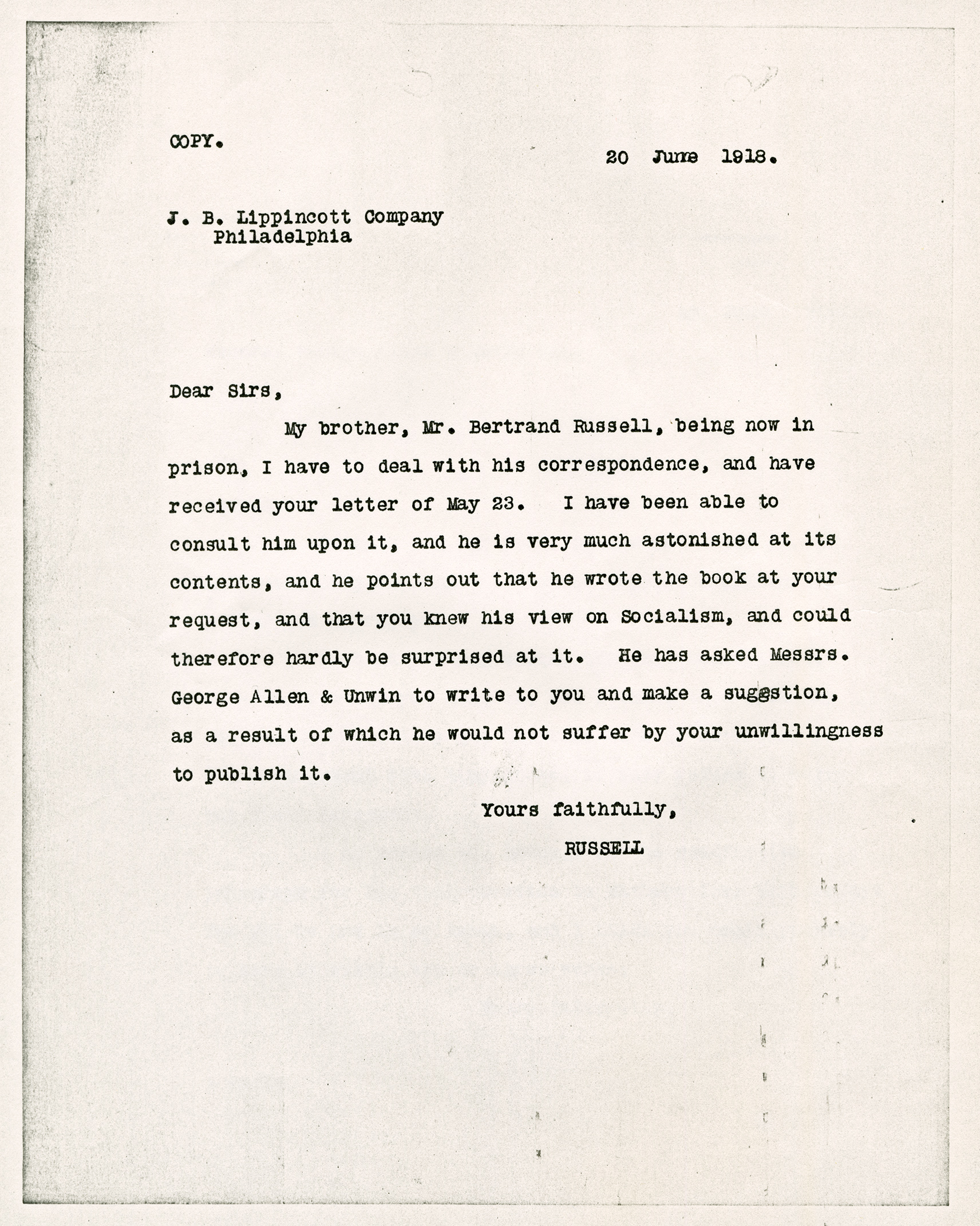Brixton Letter 23
BR to The J.B. Lippincott Company (via Frank Russell)
June 20, 1918
- TL(CAR)
- Reading
- Edited by
Kenneth Blackwell
Andrew G. Bone
Nicholas Griffin
Sheila Turcon
Cite The Collected Letters of Bertrand Russell, https://russell-letters.mcmaster.ca/brixton-letter-23
BRACERS 48709
20 June 1918.
J. B. Lippincott Company1
Philadelphia
Dear Sirs,
My brother, Mr. Bertrand Russell, being now in prison, I have to deal with his correspondence, and have received your letter of May 23.2 I have been able to consult him upon it, and he is very much astonished at its contents, and he points out that he wrote the book3 at your request, and that you knew his view on Socialism, and could therefore hardly be surprised at it. He has asked Messrs. George Allen & Unwin to write to you and make a suggestion, as a result of which he would not suffer by your unwillingness to publish it.
Yours faithfully,
RUSSELL
- 1
[document] The letter was edited from a photocopy of the unsigned carbon copy in the Allen & Unwin archives at the University of Reading. The signature is typed.
- 2
your letter of May 23 BRACERS 48708.
- 3
the book I.e., Roads to Freedom. Henry Holt and Company published it in March 1919 as Proposed Roads to Freedom. See Letter 21, note 5.
Brixton Prison
Located in southwest London Brixton is the capital’s oldest prison. It opened in 1820 as the Surrey House of Correction for minor offenders of both sexes, but became a women-only convict prison in the 1850s. Brixton was a military prison from 1882 until 1898, after which it served as a “local” prison for male offenders sentenced to two years or less, and as London’s main remand centre for those in custody awaiting trial. The prison could hold up to 800 inmates. Originally under local authority jurisdiction, local prisons were transferred to Home Office control in 1878 in an attempt to establish uniform conditions of confinement. These facilities were distinct from “convict” prisons reserved for more serious or repeat offenders sentenced to longer terms of penal servitude.
Frank Russell
John Francis (“Frank”) Stanley Russell (1865–1931; 2nd Earl Russell from 1878), BR’s older brother. Author of Lay Sermons (1902), Divorce (1912), and My Life and Adventures (1923). BR remembered Frank bullying him as a child and as having the character and appearance of a Stanley, but also as giving him his first geometry lessons (Auto. 1: 26, 36). He was accomplished in many fields: sailor, electrician, house builder, pioneer motorist, local politician, lawyer, businessman and company director, and (later) constructive junior member of the second Labour Government. Frank was married three times. The first marriage involved serious legal actions by and against his wife and her mother, but a previous scandal, which ended his career at Oxford, had an overshadowing effect on his life (see Ruth Derham, “‘A Very Improper Friend’: the Influence of Jowett and Oxford on Frank Russell”, Russell 37 [2017]: 271–87). The second marriage was to Mollie Sommerville (see Ian Watson, “Mollie, Countess Russell”, Russell 23 [2003]: 65–8). The third was to Elizabeth, Countess von Arnim. Despite difficulties with him, BR declared from prison: “No prisoner can ever have had such a helpful brother” (Letter 20).
George Allen & Unwin Ltd.
George Allen & Unwin Ltd., founded by Stanley Unwin in 1914, was BR’s chief British publisher, had published Principles of Social Reconstruction in 1916, and was in the process of publishing Roads to Freedom (1918) while BR was in Brixton.
The J.B. Lippincott Company
J.B. Lippincott Company, founded in 1836, was one of the world’s largest publishers. How it came to approach BR in 1917 is unknown, but it followed upon the success of the Century Company’s US publication of Why Men Fight (1917), the retitled Principles of Social Reconstruction (1916). See Letter 21, note 6.
